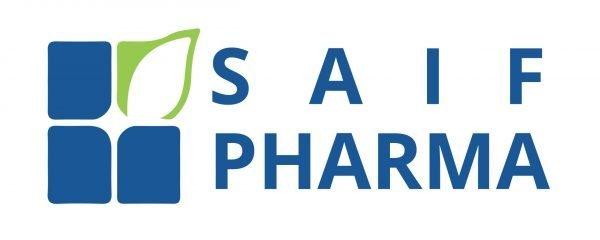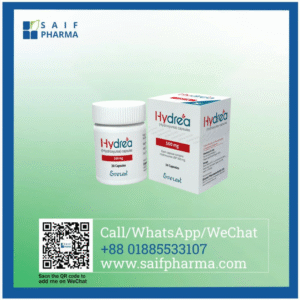Overview
Rubitor 50 mg (Epirubicin Hydrochloride Injection) is a premium-grade anthracycline cytotoxic chemotherapy medication manufactured by Eskayef Pharmaceuticals Ltd and distributed worldwide by Saif Pharma. This high-potency oncology medicine plays a crucial role as a component of adjuvant therapy for patients with evidence of axillary node tumor involvement following primary breast cancer resection.
Clinical Applications
Rubitor 50 mg Injection has established itself as an essential element in modern breast cancer treatment protocols. When used as adjuvant therapy following surgical resection, Rubitor effectively targets residual cancer cells, substantially reducing recurrence risk in patients with node-positive breast cancer. The active ingredient, Epirubicin Hydrochloride, belongs to the anthracycline antibiotic class, renowned for its potent cytotoxic properties against rapidly dividing cancer cells.
Mechanism of Action
Epirubicin employs multiple mechanisms to combat cancer cells:
- Intercalates between DNA base pairs, creating steric obstruction
- Initiates DNA cleavage by inhibiting topoisomerase II enzyme activity
- Disrupts DNA helicase functionality
- Generates cytotoxic free radicals that damage cellular components
This comprehensive approach effectively disrupts DNA and RNA synthesis processes, preventing cancer cell replication and promoting apoptosis (programmed cell death).
Pharmacokinetic Profile
Understanding Rubitor 50 mg’s pharmacokinetics is essential for optimizing treatment protocols:
- Distribution: After intravenous administration, Epirubicin rapidly and extensively distributes throughout body tissues. Approximately 77% binds to plasma proteins (primarily albumin), a process independent of drug concentration.
- Metabolism: The liver extensively and rapidly metabolizes Epirubicin, with additional metabolism occurring in other organs and cells, including red blood cells.
- Excretion: Elimination primarily occurs through biliary excretion, with urinary excretion playing a secondary role. The terminal elimination half-life ranges from 30-40 hours.
Dosage and Administration Guidelines
Rubitor 50 mg Injection must be administered via intravenous infusion under the supervision of qualified physicians experienced in cytotoxic therapy. The recommended dosage ranges from 100 to 120 mg/m², administered in repeated 3-4 week cycles. The total dose may be given on day 1 of each cycle or divided equally between days 1 and 8.
Established treatment regimens include:
CEF-120 Protocol:
- Cyclophosphamide: 75 mg/m² PO D 1-14
- Epirubicin (Rubitor): 60 mg/m² IV D 1, 8
- 5-Fluorouracil: 500 mg/m² IV D 1, 8
- Repeated every 28 days for 6 cycles
FEC-100 Protocol:
- 5-Fluorouracil: 500 mg/m²
- Epirubicin (Rubitor): 100 mg/m²
- Cyclophosphamide: 500 mg/m²
- All drugs administered intravenously on day 1
- Repeated every 21 days for 6 cycles
Patients receiving the higher 120-mg/m² regimen should also receive prophylactic antibiotic therapy to mitigate potential complications.
Special Population Considerations
Dosage adjustments are necessary for specific patient populations:
Hematologic Toxicities:
- For nadir platelet counts <50,000/mm³, ANC <250/mm³, neutropenic fever, or Grades 3/4 nonhematologic toxicity, reduce subsequent cycle doses to 75% of the current cycle’s Day 1 dose.
- Delay treatment until platelet counts are ≥100,000/mm³, ANC ≥1500/mm³, and nonhematologic toxicities have recovered to ≤Grade 1.
Bone Marrow Dysfunction:
- Consider lower starting doses (75-90 mg/m²) for heavily pretreated patients, those with pre-existing bone marrow depression, or those with neoplastic bone marrow infiltration.
- For divided dose schedules, reduce day 8 dose to 75% of day 1 dose if platelet counts are 75,000-100,000/mm³ and ANC is 1000-1499/mm³.
- Omit day 8 dose if platelet counts are <75,000/mm³, ANC <1000/mm³, or if Grades 3/4 nonhematologic toxicity has occurred.
Hepatic Impairment:
- For patients with bilirubin 1.2-3 mg/dL or AST 2-4 times upper limit of normal: administer 50% of recommended starting dose
- For patients with bilirubin >3 mg/dL or AST >4 times upper limit of normal: administer 25% of recommended starting dose
Renal Impairment:
- Consider lower doses for patients with severe renal impairment (serum creatinine >5 mg/dL)
Geriatric Patients:
- Implement particularly close monitoring for toxicity in female patients ≥70 years of age
Drug Interactions
Healthcare providers should be vigilant regarding important drug interactions with Rubitor 50 mg:
- Cardioactive Compounds: Close cardiac function monitoring required when used with calcium channel blockers and other medications that could cause heart failure
- Cimetidine: Increases Rubitor exposure; should be discontinued during Rubitor treatment
- Other Cytotoxic Drugs: May cause additive toxicity, especially hematologic and gastrointestinal effects
- Paclitaxel: Prior or subsequent administration increases systemic exposure to Rubitor and its metabolites
- Docetaxel: Prior or subsequent administration increases systemic exposure to Rubitorol and 7-deoxydoxorubicin aglycone
- Radiation Therapy: May induce inflammatory recall reaction at irradiation sites
- Hepatic Function: Concomitant therapies affecting liver function may impact Rubitor metabolism, pharmacokinetics, efficacy, and toxicity
Safety Profile and Contraindications
Rubitor 50 mg is contraindicated in patients with known hypersensitivity to Epirubicin, other anthracyclines or anthracenediones, or any components of the formulation.
Common adverse effects include:
- Myelosuppression (reduction in bone marrow activity)
- Cardiotoxicity (heart damage)
- Alopecia (hair loss)
- Hyperpyrexia (abnormally high fever)
- Lethargy and fatigue
- Amenorrhea (absence of menstruation)
- Gastrointestinal disturbances (nausea, vomiting, diarrhea)
- Fever and rash
- Anorexia (loss of appetite)
- Harmless reddish discoloration of urine for 1-2 days
Pregnancy and Lactation
Rubitor carries Pregnancy Category D classification, indicating positive evidence of human fetal risk. There are no adequate well-controlled studies in pregnant women. Use during pregnancy only when potential benefits clearly justify potential fetal risks. Since Epirubicin may be excreted in breast milk and could cause serious adverse reactions in nursing infants, breastfeeding should be discontinued during therapy.
Precautions and Monitoring
Before initiating Rubitor 50 mg treatment:
- Ensure patients have recovered from acute toxicities of prior cytotoxic treatments
- Conduct careful baseline assessment of blood counts
- Measure serum levels of total bilirubin, AST, and creatinine
- Evaluate cardiac function via left ventricular ejection function (LVEF)
During treatment, patients should be monitored for:
- Clinical complications due to myelosuppression
- Signs of cardiotoxicity, especially with greater cumulative exposure
- Development of severe neutropenia requiring supportive care
- Potential infectious complications
Overdose Management
In case of overdose, provide supportive treatment including:
- Antibiotic therapy
- Blood and platelet transfusions
- Colony-stimulating factors
- Intensive care as needed
Monitor patients carefully for delayed congestive heart failure (CHF), which may manifest months after anthracycline administration. Provide appropriate supportive therapy if signs of CHF develop.
Quality Assurance
As a product of Eskayef Pharmaceuticals Ltd., one of Bangladesh’s leading pharmaceutical companies with over 31 years of experience, Rubitor 50 mg maintains the highest quality standards. Eskayef has established itself as a producer of world-class medicines, while Saif Pharma has built a reputation as a trusted global distributor of oncology medications since 2014.
Storage and Handling
Store Rubitor 50 mg in a refrigerator at 2-8°C. Do not freeze. Protect from light and keep out of reach of children. If refrigerated solution forms a gel, it will return to a mobile solution after 2-4 hours at controlled room temperature (15-25°C). Always inspect for particulate matter and discoloration before administration. Follow proper handling and disposal procedures for anticancer drugs.
Global Availability
Through Saif Pharma’s extensive distribution network, Rubitor 50 mg is available in over 60 countries worldwide, including the United States, Canada, Saudi Arabia, UAE, China, India, and Pakistan. Saif Pharma’s commitment to providing affordable, high-quality oncology medications ensures that patients globally can access this essential breast cancer treatment.
For more information about Rubitor 50 mg or other oncology medications, visit www.saifpharma.com or contact the manufacturer at www.skfbd.com.







